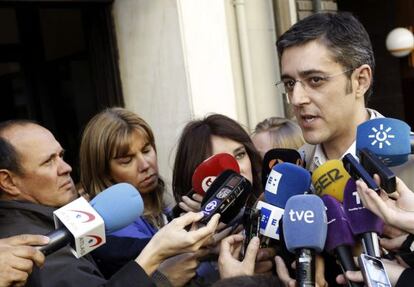Galician Socialists defy central party by continuing with plans for primaries
PSdeG leader Pachi Vázquez says system gives greater voice to the grassroots

The Galician branch of the Socialist Party (PSdeG) will go ahead with plans to elect its own leader through primaries in early June, in clear defiance of central party instructions.
PSdeG secretary general Pachi Vázquez warned Socialists in Madrid that “nobody should hide behind statutory rules” to avoid establishing a system that would give a greater voice to grassroots members of the party.
National party leaders contend that internal rules cannot be changed just like that and that all secretaries-general must be elected at an extraordinary congress, where only a specific number of representatives — known as compromisarios — get to vote. This is the way that Alfredo Pérez Rubalcaba was elected national party secretary in 2011. Rubalcaba has personally told Vázquez that party rules prevent a secretary-general from being selected through primaries (only electoral candidates may be elected this way). The rules state that the Galician secretary general must be chosen at the Galician party congress scheduled for July 6.
The congressional speaker for the Socialist Party (PSOE), Soraya Rodríguez, added that it is extremely keen to find a formula that will “combine respect for the statutes with the demand for greater member participation as expressed by the Galician Socialists.”
But Vázquez insists that changing internal rules to accommodate primaries is just a matter of “political will” and that “if we are able to propose reforms to the Constitution, to the Senate and to mortgage law, yet we cannot adapt an internal norm so grassroots members can participate... that is just not very believable.”
The Galician leader also talked about “the delegitimization of politics as a tool for change in society” and underscored “the feelings of disaffection toward the major parties in Spain,” a reference to declining support for the two main political groups, the PSOE and the conservative Popular Party, in recent opinion polls. Vázquez is selling his consultative primaries as a way to get back in touch with the party’s base and bring renewed legitimacy to the PSOE, which has been in a state of internal strife ever since its resounding defeat in the general elections of November 2011.
Pachi Vázquez said he will keep working with national party headquarters until the last minute to try to reach an agreement, but added that if Spanish society is being asked for greater participation and transparency, then it is hard to understand why the PSOE would not give the same to its own members first. “Galicia wants to send a message to Galician Socialism and to the entire world: Galician party members are going to elect the secretary general in this consultation.”
Vázquez has earned support from his Madrid colleague, Tomás Gómez, who stated that “we mustn’t be afraid of democracy” and that “one person, one vote, is to gain more democracy.”
The leader of the Madrid Socialists added that change within the PSOE is “inevitable” and that “this is the feeling everyone has.”
Rubalcaba has refused to comment on stories regarding possible candidates to succeed him as national party secretary in 2014 — particularly Patxi López, leader of the Basque Socialists, and Eduardo Madina, the secretary of the Socialist parliamentary group. “The PSOE is not focusing on this,” he said last week. “It’s very nice to talk about who the candidate will be, but Spaniards have other problems right now other than who will head the PSOE.”
Tu suscripción se está usando en otro dispositivo
¿Quieres añadir otro usuario a tu suscripción?
Si continúas leyendo en este dispositivo, no se podrá leer en el otro.
FlechaTu suscripción se está usando en otro dispositivo y solo puedes acceder a EL PAÍS desde un dispositivo a la vez.
Si quieres compartir tu cuenta, cambia tu suscripción a la modalidad Premium, así podrás añadir otro usuario. Cada uno accederá con su propia cuenta de email, lo que os permitirá personalizar vuestra experiencia en EL PAÍS.
¿Tienes una suscripción de empresa? Accede aquí para contratar más cuentas.
En el caso de no saber quién está usando tu cuenta, te recomendamos cambiar tu contraseña aquí.
Si decides continuar compartiendo tu cuenta, este mensaje se mostrará en tu dispositivo y en el de la otra persona que está usando tu cuenta de forma indefinida, afectando a tu experiencia de lectura. Puedes consultar aquí los términos y condiciones de la suscripción digital.








































